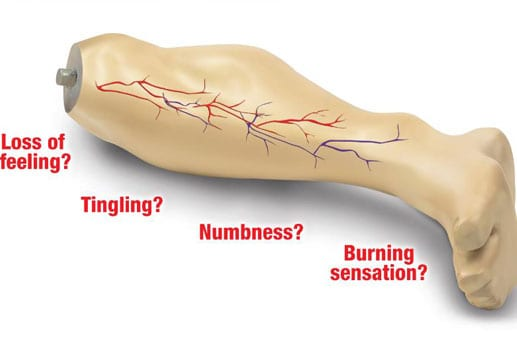Nerve Damage (Neuropathy) in Diabetes: A Painful Reality

“Diabetes can lead to nerve damage, causing numbness, tingling, and pain in the hands and feet. Learn about the causes, symptoms, and treatments of neuropathy.”
Introduction
Living with diabetes is challenging, but the complications that come with it can be even more daunting. One such complication is nerve damage, also known as neuropathy.
Nerve damage caused by diabetes can lead to numbness, tingling, and pain in the hands and feet. It affects millions of people worldwide, making it a significant health concern.
This article will explore the causes, symptoms, and treatments of nerve damage (neuropathy) in diabetes. We will also answer frequently asked questions to help you better understand this condition.
What Causes Nerve Damage (Neuropathy) in Diabetes?
Nerve damage in diabetes is caused by high blood sugar levels that damage the nerves over time. This damage can occur in any part of the body, but it is most common in the hands and feet.
Symptoms of Nerve Damage (Neuropathy) in Diabetes
The symptoms of neuropathy can vary depending on the type of nerves that are affected. The most common symptoms include:
- Numbness and tingling in the hands and feet
- Burning or sharp pain
- Loss of coordination and balance
- Muscle weakness and atrophy
- Cramps and spasms
- Sensitivity to touch or temperature
- Changes in skin color or texture
- Loss of reflexes
How is Nerve Damage (Neuropathy) in Diabetes Diagnosed?
Your doctor may diagnose neuropathy by performing a physical examination and conducting several tests, including:
- Nerve conduction studies: These tests measure the speed of nerve impulses and the strength of the muscles that respond to them.
- Electromyography (EMG): This test measures the electrical activity of the muscles and the nerve cells that control them.
- Blood tests: Your doctor may also order blood tests to check for vitamin deficiencies, thyroid function, and other conditions that can cause neuropathy.
How is Nerve Damage (Neuropathy) in Diabetes Treated?
There is no cure for neuropathy, but several treatments are available that can help manage the symptoms and slow down the condition’s progression. Some of the treatment options include:
- Controlling blood sugar levels: Keeping blood sugar levels under control can help prevent further nerve damage.
- Medications: Certain medications, such as antidepressants, anti-seizure drugs, and pain relievers, can help manage neuropathy symptoms.
- Physical therapy: Physical therapy can help improve muscle strength and flexibility and reduce pain and stiffness.
- Transcutaneous electrical nerve stimulation (TENS): TENS is a therapy that uses low-level electrical currents to stimulate the nerves and reduce pain.
- Surgery: In severe cases, surgery may be necessary to relieve pressure on the nerves.
FAQs
Q: Is neuropathy in diabetes reversible?
A: Unfortunately, neuropathy has no cure, but early detection and management can help slow down the condition’s progression.
Q: Can neuropathy in diabetes be prevented?
A: While there is no guaranteed way to prevent neuropathy, controlling blood sugar levels, maintaining a healthy diet, and exercising regularly can reduce the risk of developing the condition.
Q: Can neuropathy in diabetes affect other parts of the body?
A: Yes,
Q: Are there any lifestyle changes that can help manage neuropathy in diabetes?
A: Certain lifestyle changes can help manage neuropathy symptoms and improve overall health. Some of these changes include:
- Quitting smoking: Smoking can increase the risk of nerve damage and worsen neuropathy symptoms.
- Maintaining a healthy weight: Being overweight or obese can stress the nerves more and increase the risk of neuropathy.
- Eating a healthy diet: A diet rich in fruits, vegetables, and whole grains can help improve blood sugar levels and reduce the risk of nerve damage.
- Exercising regularly: Exercise can help improve blood flow and reduce the risk of developing neuropathy.
Conclusion
Nerve damage (neuropathy) caused by diabetes is a painful and debilitating condition affecting millions worldwide. While there is no cure for neuropathy, several treatment options can help manage the symptoms and slow the progression of the condition.
Controlling blood sugar levels, taking medications, and making lifestyle changes can help manage neuropathy and improve your overall health. If you are experiencing neuropathy symptoms, you must talk to your doctor to get a proper diagnosis and start treatment as soon as possible.
Remember, prevention is key when it comes to neuropathy in diabetes. By maintaining a healthy lifestyle and controlling your blood sugar levels, you can reduce your risk of developing this painful condition.